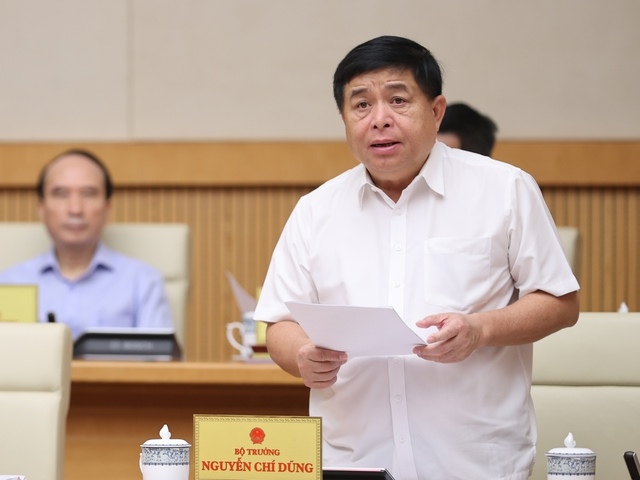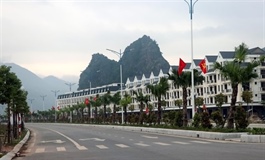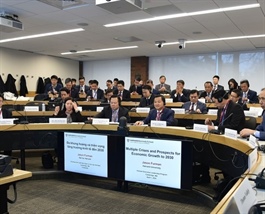Effective macro policies key to achieve 6.5% growth rate
Effective macro policies key to achieve 6.5% growth rate
GDP growth in the first quarter reached 5.66%, the highest since 2020.
Achieving a 6.5% growth rate set for 2024 would depend on global and domestic conditions and the implementation of concerted fiscal and monetary policies, Minister of Planning and Investment (MPI) Nguyen Chi Dung made the remarks at a monthly Government meeting held today [April 3].

Overview of the Government meeting. Photos: Nhat Bac |
Dung added that the socio-economic situation in the first quarter of this year showed better performance in many sectors compared to the same period in 2023. GDP growth in the first quarter reached 5.66%, the highest since 2020. Additionally, the macroeconomic fundamentals remained stable, with inflation controlled at 3.77% year-on-year. Based on this, Dung noted that the MPI has proposed two economic growth scenarios for this year.
Scenario 1 assumes a GDP growth rate of 6%, the lowest target set by the National Assembly. Under this scenario, the growth rate for the last nine months of the year would be approximately 6.12%, with the second quarter at 5.85%. The third and fourth quarter GDP growth rates would be 6.22% and 6.28%, respectively.
Scenario 2 envisages an annual economic growth rate of 6.5%. In this case, GDP growth rates for the second and third quarters would be 6.32% and 6.79%, respectively. The fourth quarter alone would need to achieve a growth rate of 7.08%.
Dung recommended opting for Scenario 2, which would result in a GDP growth rate of 6.5% in 2024. However, he emphasized that achieving the highest growth rate would depend on global and domestic conditions, as well as the implementation of concerted fiscal and monetary policies.
In this regard, Prime Minister Pham Minh Chinh called on ministries, sectors, and localities to strive for the highest level of performance, in particular, to achieve a growth rate of around 6.5% this year.
He urged ministries and sectors to be proactive in their policy responses, citing the example of the implementation of electronic invoicing for retail fuel, which was completed in March instead of the two years originally planned. Similarly, the long-delayed 500 kV power line project could now be completed by June thanks to great resolve. "These examples show that determination and innovative approaches are needed to drive progress," said the Prime Minister.
Challenges remain significant
Before this, Minister Dung noted that the domestic economy still faced significant pressure from inflation and declining purchasing power. This was reflected in the challenging situation for businesses in the first quarter. According to an MPI report, nearly 74,000 businesses exited the market, an increase of approximately 23% year on year, mainly small and medium-sized enterprises. The number of businesses temporarily suspending operations and those awaiting liquidation increased by 24.5% and 18.4%, respectively.
The recovery in industrial production was slow, and the growth rate of domestic consumer demand in the first quarter was lower than in the same period in 2023 and the years before the 2011-2019 pandemic.
"Decreased purchasing power, tightened spending, and cautious, savings-oriented attitudes among businesses and consumers are evident," said Dung, adding that low market demand and fierce competition are now the biggest challenges for processing and manufacturing enterprises today. Sectors such as aviation faced difficulties as the number of commercial aircraft significantly decreased. Many domestic flight routes have been canceled or reduced frequently, leading to higher ticket prices and affecting tourism and travel demand.
The real estate market continued to face obstacles, especially in the procedures for developing social housing. The disbursement of the VND120 trillion ($5.2 billion) social housing loan package was slow.
The trading shutdown incident at VNDirect Securities at the end of March, which was attributed to a cyberattack, has had a significant impact on investor sentiment and rights. This could affect the consideration of upgrading the stock market.

Prime Minister Pham Minh Chinh at the meeting. |
From this incident, the MPI emphasized the need for administrative bodies to strengthen information security and cybersecurity, as well as to improve regulations to protect investors.
To achieve this year's socio-economic goals, Dung suggested that ministries and sectors promptly finalize guidance for implementing laws on Land, Credit Institutions, Real Estate Business, and Housing and submit them to the National Assembly for early enforcement, preferably by July.
"Localities should review documents within their jurisdiction to make them compatible with the Land Law as soon as it comes into effect, especially in setting land price lists," Dung said.
Despite interest rate cuts, businesses continued to face difficulties in accessing credit, and non-performing loans in the banking system increased significantly. The non-performing loan ratio reached 4.79% by the end of January, more than double the level at the end of 2022 (2.03%). This increased the costs for the banking system and affected the reduction of lending rates.
Summing up the meeting, Prime Minister Chinh requested the State Bank of Vietnam to ensure capital supply, closely monitor bad debts and take measures to reduce lending interest rates. The central bank must also ensure stability in the foreign exchange and gold markets to prevent unfavorable fluctuations.
The Ministry of Finance was tasked with finding solutions to upgrade the stock market as soon as possible and ensuring the safety of financial information systems and securities in the face of increasing cyber-attacks.



























